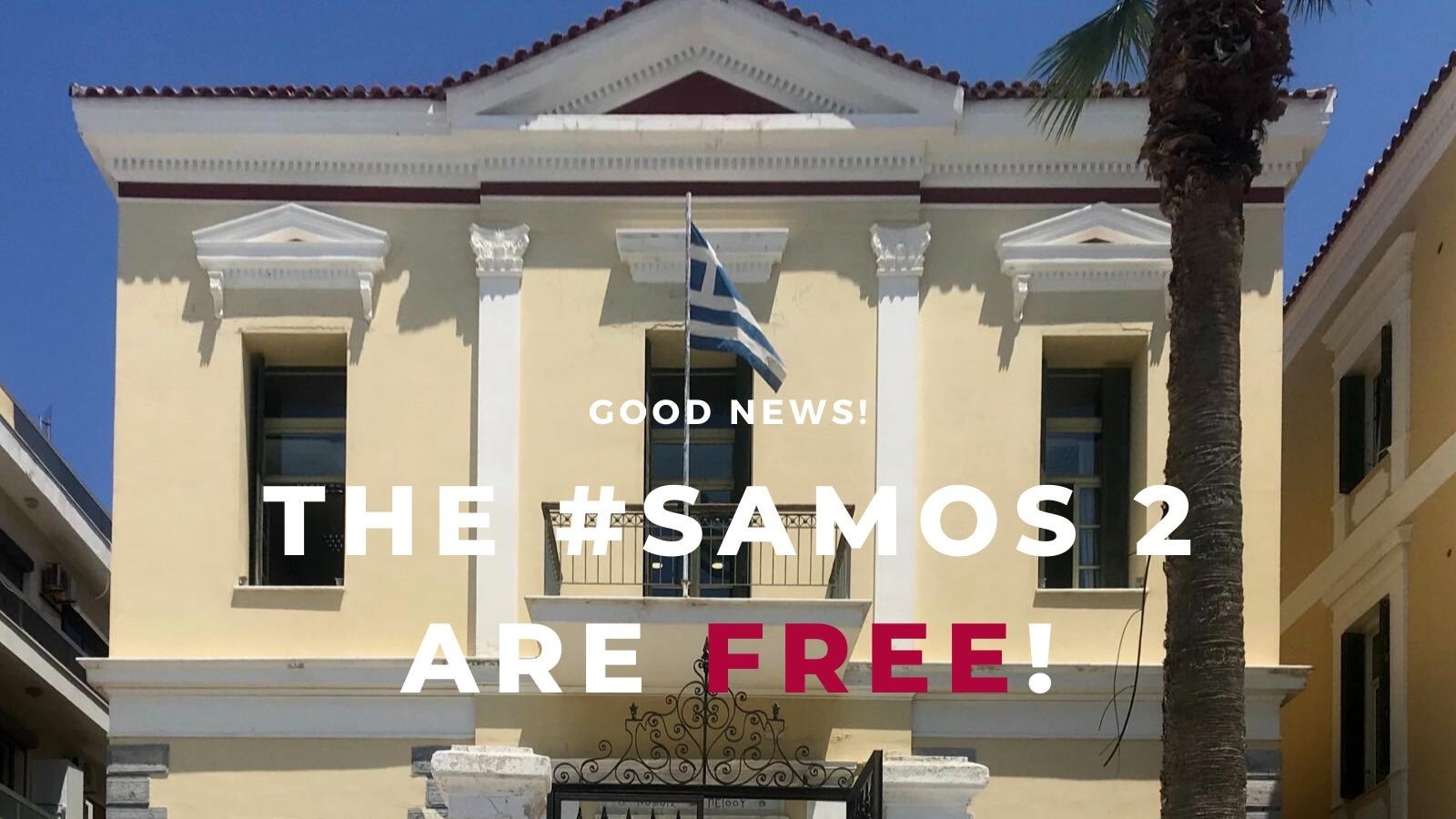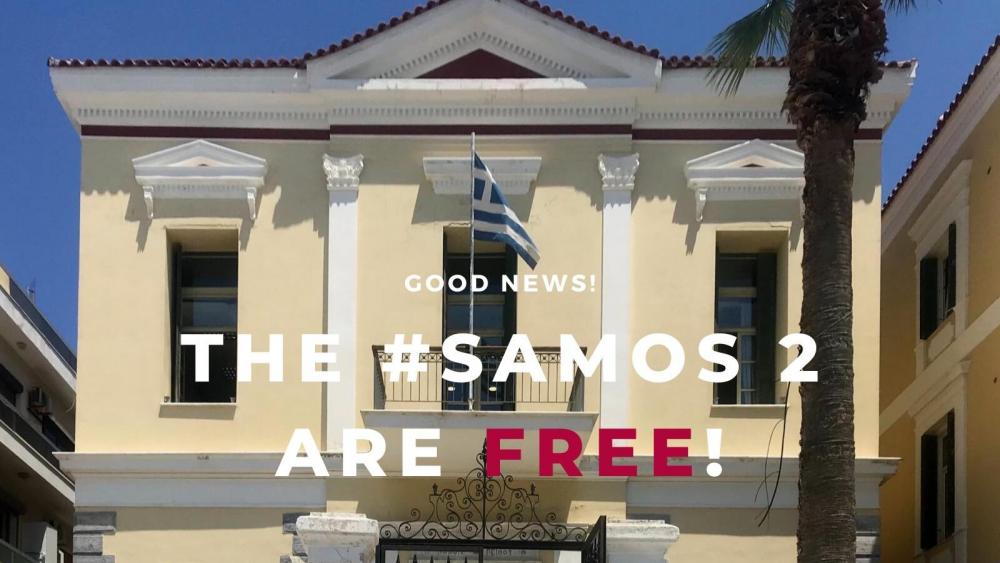The #Samos are free!
Deutsch | Ελληνικά | Italiano
On May 18, the Criminal Chamber of the Samos Regional Court pronounced an exceptional verdict in the case of Hasan and N, the #Samos2.: The outcome, that the two are “free”, is a victory for the defendants, their defense, a joint campaign by numerous groups and organisations from all over Europe and thus for the fight against criminalisation of people on the move as a whole.
N., the father of the drowned child, who was charged in an unprecedented indictment with "endangering the life of his child" and therefore facing up to 10 years in prison, was finally acquitted. It was impossible to hold him legally responsible for the death of his child. This is an important sign for the Greek authorities, showing that such an absurd charge is doomed to failure.
Also in the case of Hasan, who was criminalised for steering the boat, the court surprised with an unusual sentence. Although he was found guilty on all charges - “facilitation of unauthorized entry”, “involuntary manslaughter” of the child and for his own “unauthorized entry” - he was ultimately sentenced to ‘only’ 1 year and 5 months on probation. Compared to other decisions in similar cases, this is a very low sentence, as people charged with "aiding and abetting unauthorized entry" are often sentenced to several hundred years in prison even if the real punishment is then capped at 20 years, because that is the maximum time for imprisonment in Greece. “These verdicts shouldn’t be the exception but the norm. We are very glad for them but very worried for the rest. Still their lives were damaged irreparably. We need a change of legislation. Until then how many more lives will be destroyed?", says Dimitris Choulis, one of the lawyers for the #Samos2.
According to Achim Rollhäuser, who observed the trial as a member of the European Democratic Lawyers, it was also predictable “[…] that Hasan, the boat driver, was convicted. He had to be the scapegoat. A person, a child indeed, had died; this could not go unpunished. Since neither the Greek coast guard, nor the Greek state as a whole, nor the EU with its murderous border policy, could be held responsible by the court: the only option was to blame the refugee who steered the boat.”
Before the trial began, the presiding judge had ordered most of the people in the audience out of the courtroom. While all supporters, including members of local groups from Samos and of international NGOs such as “Still I rise” and “borderline-europe”, had to leave the courtroom, only two Greek translators, three journalists and one trial observer were allowed to remain in the courtroom. The reason given was Covid regulations. The fact that there were many more people in the courtroom during the previous hearings remained uncommented on by the court, so it can be reasonably assumed that supporters and activists were most likely intentionally excluded.
At the hearing, the defense (consisting of three lawyers: Dimitris Choulis, Alexandros Georgoulis and Elli Kriona-Saranti) presented two witnesses to the court: the sister of Hasan, who was also on the capsized boat, and Iasonas Apostolopoulos, a well-known sea rescuer from Greece who is operating in the Mediterranean Sea and who knows the difficult conditions migrants face on the high seas. While Iasonas was denied testimony by the court because the judges only wanted to hear witnesses who had experienced or observed the incident themselves, Hasan's sister was called into the courtroom and questioned about the course of events on the night of the incident, repeating that her brother was forced to steer the boat at gunpoint.
The prosecution had also summoned two witnesses - two coast guard officers who were involved in the search operation. However, only one of them appeared. The one who testified had only been present during the first rescue operation, but not, for example, during the interrogations of the defendants. He confirmed the high waves that night and said that they approached the area by car, not by boat, which, according to the lawyer Dimitris Choulis, doesn’t seem very appropriate for a shipwreck rescue operation. This and other irregularities in connection with the rescue operation (e.g. that the coast guard, by its own account, was only informed of the arrival of a boat at 5:30 a.m., many hours after the accident, although the calls for help had demonstrably been sent hours earlier) reinforce the suspicion that the rescue operation was delayed and may have contributed to the death of N.'s son. The fact that Hasan, and initially even N., should be held responsible for his son's death is symbolic of the distortion of the question of guilt being tried in Greek courtrooms.
In the case of Hasan and N., we are more than happy that they don’t have to go to prison, although they should not have been charged in the first place. It remains a scandal that people who come to Europe seeking protection are subjected to arbitrary criminal persecution instead of being offered safe passage. For many others, the prosecution continues, and every day migrants are brought to trial accused of "aiding and abetting unauthorized entry" while the EU refuses to provide legal, let alone safe, entry routes.
The lawyer Elli Kriona-Saranti analyzes the accusations against N. in the bigger picture of the European migration policies and says that it “is at least sadistic that a father had to stand trial for exposing his child to death by boarding him on an unseaworthy boat; it is precisely because of the EU States' refusal to provide legal and safe passages for non-Ukrainian refugees, that people have to resort to these perilous journeys to bring their children to safety. We are of course very happy with the judgement, but still worried that, in the case of migrants, criminal prosecution seems to be mostly driven by migration management and deterrence objectives, rather than strict adherence to criminal policy considerations. And the fact that we are still to see criminal proceedings against the perpetrators of pushbacks cannot but fuel this perception.”
For this reason, we continue our fight against the criminalization of people on the move and stand in solidarity with all those who are criminalized for helping people in need and facilitating freedom of movement. Migration is not a crime, solidarity is not a crime and freedom of movement is everyone's right.
“The outcome of the trial may have been more positive than in similar trials, but that does not mean that the defendants were given justice. We will continue to fight for the non-criminalization of people on the move”, says Nefeli Belavila from the Community Peacemaker Team Lesbos who was also observing the trial.
We demand unconditionally:
- Freedom for all those imprisoned for "boat driving", despite the fact that there is no alternative to reach the European Union;
- An end to the criminalization of migration and the imprisonment of people on the move.
Further information:
- Free the #Samos2: https://freethesamostwo.com/
- Sueddeutsche: Freispruch auf Samos
- Melting Pot Europa: «I #Samos2» N. e Hasan sono liberi
- Open Migration: Samos2, sono liberi i due rifugiati accusati di essere trafficanti
- AnsaMed: Greek court clears Afghan father over 6-year-old's death
- Infomigrants: Afghan man acquitted over son's death on journey to Greece
- Junge Welt: Freiheit für Vater von totem Flüchtlingskind
- ref.ch: Flüchtling nach Tod des Sohnes freigesprochen
- Jacobin: Throughout Europe, New Laws Are Criminalizing Desperate Refugees
Background information:
- Deutschlandfunk: Vom Mittelmeer ins Gefängnis - Wie Geflüchtete zu Schleppern gemacht werden
- taz: Prozesse gegen Flüchtlinge im Mittelmeer
- nd: Auf gefährliche Routen gezwungen
- Al Jazeera: Asylum seeker father faces 10 years in Greek jail for son’s death
- Migazin: Flüchtling wegen Ertrinkens seines Sohnes in Samos vor Gericht
- Aegean Migrant Solidariy, borderline-europe and Deportation Monitoring Aegean: Incarcerating the Marginalised - The Fight Against Alleged "Smugglers" on the Greek Hotspot Islands
Tuesday, 06 June 2022
© Photos borderline-europe


